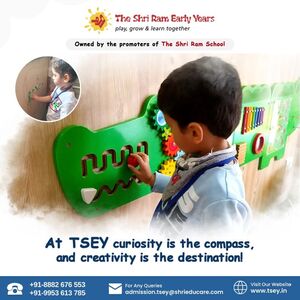Sustainability Education in Daycares: Nurturing Eco-Consciousness from a Young Age
Cuerpo
As parents, we all want to raise our children to be caring, responsible individuals who are aware of the world around them. One important aspect of this upbringing is instilling a sense of eco-consciousness from a young age. At The Shri Ram Early Years (TSEY), we strongly believe in the power of sustainability education to shape the attitudes and behaviours of our future generations. As a top preschool in Gurgaon, TSEY is committed to providing a nurturing environment for your child's holistic development, which includes honing their understanding of environmental issues.
Why Is Sustainability Education Crucial In preschools?
Research has shown that early childhood is a critical period for forming attitudes and shaping behaviours towards the environment. By introducing sustainability education in daycares, one can lay the foundation for a lifelong commitment to caring for the planet. At The Shri Ram Early Years, the faculty recognize that fostering eco-consciousness from a young age can lead to positive long-term impacts on the environment and society as a whole.
What Does Sustainability Education Look Like?
The approach to sustainability education is based on the understanding that children learn best through hands-on experiences and exploration. Integrating eco-friendly practices into our daily routines and creating opportunities for children to engage with nature can bring sustainability into education. Here is a glimpse into what you can expect when your child joins TSEY:
- Nature-Based Learning: The outdoor spaces are designed to stimulate curiosity and encourage active exploration. From gardening and composting to nature walks and animal encounters, TSEY provides opportunities for children to connect with the natural world firsthand.
- Waste Management: They teach the importance of reducing, reusing, and recycling through age-appropriate activities. Children learn to sort waste, create artwork from recycled material, and understand the impact of their actions on the environment.
- Conservation Awareness: TSEY introduces concepts of energy conservation, water conservation, and biodiversity through interactive games and playful learning activities. The goal is to empower children to become environmental stewards and make a positive difference in their daily lives.
- Sustainable Practices: The preschool in Gurgaon implements eco-friendly practices such as using non-toxic, biodegradable cleaning products, serving organic and locally sourced meals, and promoting sustainable transportation options for families.
- Eco-Crafts and DIY: TSEY encourages creativity by engaging children in eco-friendly craft projects using natural and recycled materials. This fosters an understanding of resourcefulness and the potential for turning everyday items into valuable creations.
- Community Engagement: The team extends their sustainability efforts beyond the daycare by involving families and the local community. They organize events like clean-up drives, tree planting sessions, and awareness workshops that allow children to witness the impact of collective action.
- Storytelling and Literature: Sustainability themes are integrated into storytelling sessions and age-appropriate literature. Through relatable characters and narratives, children learn about topics like endangered species, climate change, and the importance of protecting the environment.
The benefits of sustainability education at an early age are manifold. Not only does it empower children to become responsible citizens and caretakers of the planet, but it also fosters critical thinking, problem-solving, and creativity. By integrating sustainability education into a daycare curriculum, TSEY provides a unique platform for your child to develop valuable life skills while instilling love for the environment.
Why Choose The Shri Ram Early Years For Your Child's Sustainability Education?
As one of the top play schools in Gurgaon, The Shri Ram Early Years goes above and beyond to provide a holistic and eco-conscious environment for your child's growth. Our experienced and passionate educators are dedicated to creating meaningful learning experiences that inspire your child's curiosity and love for the environment. With a formal yet kindly tone and demeanour, we strive to maintain open communication with parents and ensure that every child's individual requirements too are adequately met.
Through sustainability education, The Shri Ram Early Years aims to mould young minds into compassionate, thoughtful, and environmentally conscious individuals. By nurturing these values from a tender age, we equip children with the tools they need to be active participants in shaping a sustainable and harmonious world for generations to come. Join TSEY in this enriching journey and let your child's education be a beacon of hope for a brighter future. Contact today to discover more about our comprehensive sustainability-focused curriculum or to arrange a visit to our daycare in Gurgaon.















Comentarios